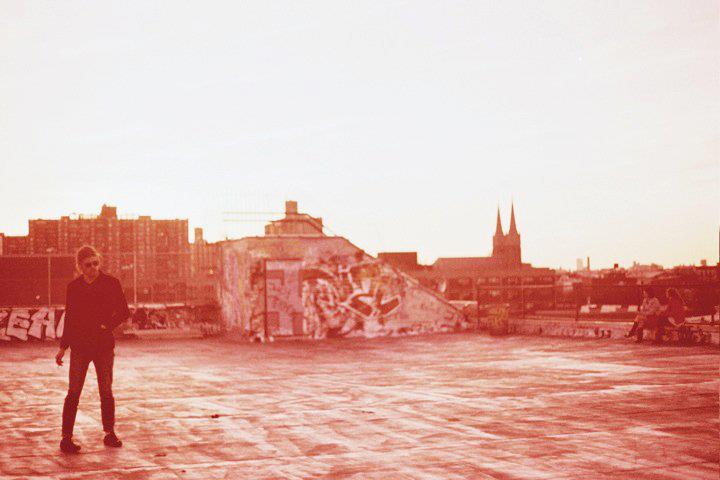
 The Rock Shop is a seductive, darkly lit bar with a rock n’ roll vibe, which unfolds into a cozy performance space in the back. As a Park Slope local, I’m keenly aware it’s one of the few solid venues in the neighborhood to catch independent musicians. I still mourn that South Paw is being turned into a rock wall gym for children. The Park Slope moms won that round. But still, Rock Shop leaves hope for local indie rock lovers. This night celebrated folk/Americana artists with dynamic lead singers. Listening to solo artistSean Kennedy and self-titled band Bill Bartholomew back to back, I was struck not only by the contrasting vocal styles, but also by their divergent approaches to songwriting and performance.
The Rock Shop is a seductive, darkly lit bar with a rock n’ roll vibe, which unfolds into a cozy performance space in the back. As a Park Slope local, I’m keenly aware it’s one of the few solid venues in the neighborhood to catch independent musicians. I still mourn that South Paw is being turned into a rock wall gym for children. The Park Slope moms won that round. But still, Rock Shop leaves hope for local indie rock lovers. This night celebrated folk/Americana artists with dynamic lead singers. Listening to solo artistSean Kennedy and self-titled band Bill Bartholomew back to back, I was struck not only by the contrasting vocal styles, but also by their divergent approaches to songwriting and performance.
Folk music has seen a revival and reinterpretation as of late, but is still rooted in its oral tradition. Stories pass down from generation to generation in the form of lyrics, and focus on themes centered around class. The Americana genre encompasses music that is patriotic, nostalgic, and rooted in early American music forms such as bluegrass, folk and country. Bill Bartholomew captures the essence of both genres, and melds these characteristics with his own rock and roll vision.
Bartholomew’s lyrics take precedence in his songs, and his vocals give a crystal clear, clean-cut delivery. His music tends to carry listeners along with his upbeat, energetic demeanor. A few poignant folk style ballads are in his repertoire as well. “Morgantown” looks into social responsibility of small town lower class struggles. These ballads capture Bartholomew’s vocal expressiveness best.
Vocalist Gabriella Rassi is truly what makes this group unique. She added beautiful harmonies to Bartholomew’s singing, and also plays the harmonium, which for those not familiar, is a portable pump organ made popular in the late 19th century. This piece adds a fantastic vintage sound to the music, and without her, the band risks sliding into too commonplace a sound. Already Bartholomew’s vocals and songwriting style are reminiscent of folk rock band Wilco, which in many ways is a compliment, but without a compelling difference in sound, Bartholomew’s music has already been done.
Bartholomew has put in the work with songwriting and fronting the group, and he often does perform his sets solo. But as an audience member, I found it frustrating that some potential stand out moments from the other artists were overshadowed and struggled to cut through the mix. Rassi’s voice and harmonium playing were often buried in the songs (although this is partly a sound engineer issue). Overall, the set was energetic, honest and well honed. Bill Bartholomew and the Governours’ song “World on a Wire” is a notable song to check out.
Another performance of the night was Sean Kennedy, who is not to be confused with the Scottish Michael Bublé doppelganger of the same namesake (yes, this is a real person). Kennedy performed a solo act with guitar and exposed, emotive vocals. His stripped down performance and sorrowful, sensitive mystique garnered the rapt attention of a few young, single ladies in the crowd. A ways into his set, he divulged some lyric meaning to reference a time he recently spent living with his grandmother to save money. His grandma’s neighbor was a woman who apparently had the hots for him. His storytelling is unusual at times, but also strikes a chord with the dreamer and the struggling artist.
Kennedy’s singing voice is striking. He has a wispy tenor timbre, which is exposed and sorrowful. This distinctive vocal choice can be a dangerous one if not kept in check, as these higher, mood driven tones can border on a whiney quality if not backed with strong conviction and depth. Kennedy crossed this line a few times.
As I listened, I imagined his music fitting best on an indie compilation, where artist variation is sought after. His sound is well packaged and immediately accessible. Yet by the end of the 45-minute run, my ears began to fatigue of such similar emotional content. Kennedy could do well to add another musician to the mix for longer sets. The power in his emotive, sorrowful sound could be explosive if balanced with more instrumentation and fully exposed only on rare occasion.
The evening’s folk/Americana vibe was refreshing to hear, as each artist added his or her own signature twist to the genre. Folk and Americana styles are relevant today as the storytelling tradition continues to express the experiences of our time. The singer/songwriter tradition is alive and well in Brooklyn, and elsewhere.

